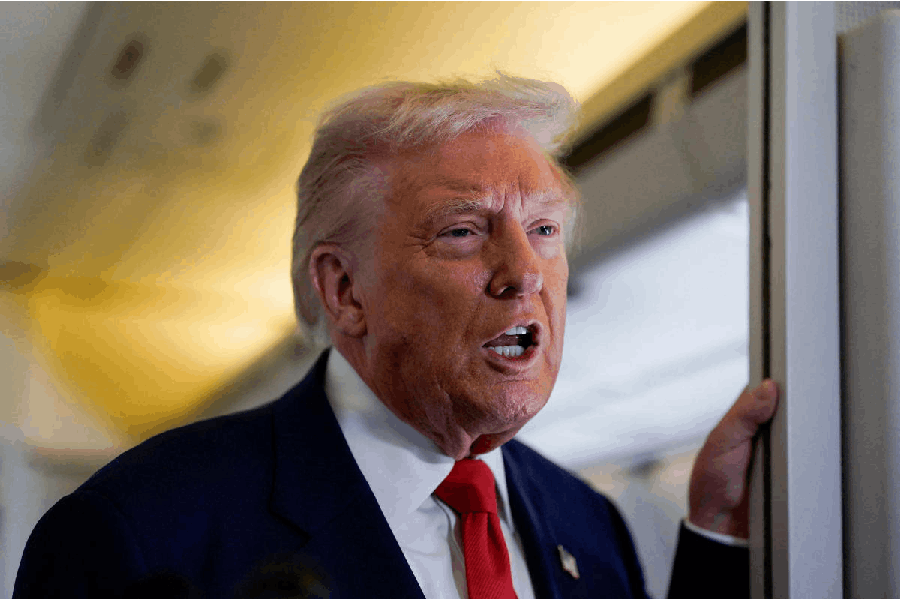The lawyer representing Donald Trump's administration faced tough questions from conservative and liberal U.S. Supreme Court justices on Wednesday over the legality of the Republican president's sweeping tariffs in a case with implications for the global economy that marks a major test of Trump's powers.
The justices pressed U.S. Solicitor General D. John Sauer, arguing for the administration, about whether Trump had intruded on the power of Congress in imposing tariffs under a 1977 law meant for national emergencies. They also asked Sauer whether Trump's application of the statute to impose tariffs of unlimited duration was a major action by the executive branch that would require clear congressional authorization.
The arguments come in appeals pursued by the administration after lower courts ruled that his unprecedented use of a 1977 federal law at issue to impose the tariffs exceeded his authority. Businesses affected by the tariffs and 12 U.S. states, most of them Democratic-led, challenged the tariffs.
Trump has heaped pressure on the Supreme Court, which has a 6-3 conservative majority, to preserve tariffs that he has leveraged as a key economic and foreign policy tool. The tariffs - taxes on imported goods - could add up to trillions of dollars for the United States over the next decade.
Sauer kicked off the arguments by defending the legal rationale employed by the president but immediately faced questions raising skepticism over the administration's arguments about the language and purpose of the statute at issue.
Trump invoked the International Emergency Economic Powers Act, or IEEPA, to impose the tariffs on nearly every U.S. trading partner. The law allows a president to regulate commerce in a national emergency.
Sauer said Trump determined that U.S. trade deficits have brought the nation to the brink of an economic and national security catastrophe. Sauer said imposition of the tariffs has helped Trump negotiate trade deals, and unwinding those agreements "would expose us to ruthless trade retaliation by far more aggressive countries and drive America from strength to failure with ruinous economic and national security consequences."
The U.S. Constitution grants Congress, not the president, the authority to issue taxes and tariffs. The administration has argued that IEEPA allows tariffs by authorizing the president to "regulate" imports to address emergencies.
The imposition of taxes on Americans "has always been the core power of Congress," conservative Chief Justice John Roberts told Sauer, adding that these tariffs seem to be raising revenue, which the Constitution contemplates as a role for Congress.
Conservative Justice Amy Coney Barrett questioned Sauer about his argument that IEEPA's language granting presidents emergency power to "regulate importation" encompasses tariffs.
"Can you point to any other place in the code or any other time in history where that phrase together 'regulate importation' has been used to confer tariff imposing authority?" Barrett asked.
Some of the justices, in questioning Sauer on whether Trump's tariffs would survive scrutiny under the "major questions doctrine," noted that Congress did not include the word tariffs in IEEPA.
Roberts challenged Sauer to explain why the court's major questions doctrine would not apply to Trump's tariffs under IEEPA.
"The justification is being used for a power to impose tariffs on any product, from any country, in any amount, for any length of time. I'm not suggesting it's not there, but it does seem like that's major authority, and the basis for that claim seems to be a misfit. So why doesn't it apply?" Roberts asked.
Sauer said the doctrine does not apply in the foreign affairs context, but Roberts then raised doubts that the president's power in this domain could override inherent powers of Congress.
"The vehicle is the imposition of taxes on Americans, and that has always been the core power of Congress," Roberts told Sauer.
Trump is the first president to use IEEPA to impose tariffs, one of the many ways he has aggressively pushed the boundaries of executive authority since he returned to office in areas as varied as his crackdown on immigration, the firing of federal agency officials and domestic military deployments.
Liberal Justice Elena Kagan pressed Sauer about his claim that Trump's tariffs are supported by the president's inherent powers under the Constitution. Kagan said the power to impose taxes and regulate foreign commerce are usually thought of as "quintessential" powers belonging to Congress, not the president.
Conservative Justice Brett Kavanaugh asked Sauer about a 10% tariff imposed on some imports in the early 1970s by then-President Richard Nixon under a predecessor statute to IEEPA.
Kavanaugh asked, "What's the significance of the Nixon example and precedent here? Because I think figuring that out is really important to deciding this case correctly."
Questions posed by conservative Justice Neil Gorsuch suggested that he thinks Sauer's claims about the breadth of the president's inherent foreign affairs powers would threaten to undermine the Constitution's separation of powers between the federal government's executive and legislative branches.
"What would prohibit Congress from just abdicating all responsibility to regulate foreign commerce - or for that matter, declare war - to the president?" Gorsuch asked.
Gorsuch said that as a practical matter Congress cannot get authority over tariffs back if IEEPA is interpreted as handing that power over to the president. This interpretation would be a "one-way ratchet toward the gradual but continual accretion of power in the executive branch and away from the people's elected representatives," Gorsuch said.
The IEEPA-based tariffs have generated $89 billion in estimated collections between February 4 and September 23, when the most recent data was released by the U.S. Customs and Border Protection agency.












